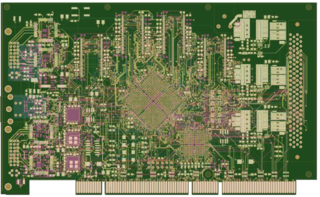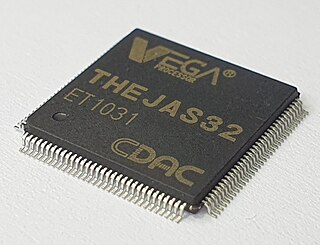
An application-specific integrated circuit is an integrated circuit (IC) chip customized for a particular use, rather than intended for general-purpose use, such as a chip designed to run in a digital voice recorder or a high-efficiency video codec. Application-specific standard product chips are intermediate between ASICs and industry standard integrated circuits like the 7400 series or the 4000 series. ASIC chips are typically fabricated using metal–oxide–semiconductor (MOS) technology, as MOS integrated circuit chips.
PARAM is a series of Indian supercomputers designed and assembled by the Centre for Development of Advanced Computing (C-DAC) in Pune. PARAM means "supreme" in the Sanskrit language, whilst also creating an acronym for "PARAllel Machine". As of November 2022 the fastest machine in the series is the PARAM Siddhi AI which ranks 120th in world, with an Rpeak of 5.267 petaflops.

Mechatronics engineering, also called mechatronics, is an interdisciplinary branch of engineering that focuses on the integration of mechanical engineering, electrical engineering, electronic engineering and software engineering, and also includes a combination of robotics, computer science, telecommunications, systems, control, and product engineering.

A mixed-signal integrated circuit is any integrated circuit that has both analog circuits and digital circuits on a single semiconductor die. Their usage has grown dramatically with the increased use of cell phones, telecommunications, portable electronics, and automobiles with electronics and digital sensors.

The Department of Computer Science is one of nine departments in the University of the Philippines Diliman College of Engineering.

The Bhabha Atomic Research Centre (BARC) is India's premier nuclear research facility, headquartered in Trombay, Mumbai, Maharashtra, India. It was founded by Homi Jehangir Bhabha as the Atomic Energy Establishment, Trombay (AEET) in January 1954 as a multidisciplinary research program essential for India's nuclear program. It operates under the Department of Atomic Energy (DAE), which is directly overseen by the Prime Minister of India.

Component-based software engineering (CBSE), also called component-based development (CBD), is a style of software engineering that aims to build software out of loosely-coupled, modular components. It emphasizes the separation of concerns among different parts of a software system.

The Open Graphics Project (OGP) was founded with the goal to design an open-source hardware / open architecture and standard for graphics cards, primarily targeting free software / open-source operating systems. The project created a reprogrammable development and prototyping board and had aimed to eventually produce a full-featured and competitive end-user graphics card.

Vidya Academy of Science and Technology (VAST) is a privately financed engineering college in Thrissur District in Kerala. The college offers a degree in Bachelor of Technology and courses in six branches of engineering - Production, Civil, Computer Science, Electrical and Electronics, Electronics and Communication, Mechanical. The college also offers a degree in Masters in Computer Application (MCA). From the year 2011, the college has offered four MTech courses and two PhD programmes in Electrical engineering & Computer science engineering. The college was established and is administered by Vidya International Charitable Trust (VICT), a body formed by more than a thousand non-resident Keralites mostly based in the Arab States of the Persian Gulf.

The Advanced Learning and Research Institute (ALaRI), a faculty of informatics, was established in 1999 at the University of Lugano to promote research and education in embedded systems. The Faculty of Informatics within very few years has become one of the Switzerland major destinations for teaching and research, ranking third after the two Federal Institutes of Technology, Zurich and Lausanne.
Kamla Nehru Institute of Technology is a state government, autonomous engineering institution located in Sultanpur, Uttar Pradesh, India. It is affiliated to Dr. A.P.J. Abdul Kalam Technical University. It has been ranked amongst the top engineering institutes under AKTU.

Kunnamangalam is a growing census town located about 14 km east of Kozhikode (Calicut) city on the Calicut - Bangalore National Highway. Nearby places are Koduvally, Mukkam, Chathamangalam, and Kattangal. India's premier educational institutions like Indian Institute of Management, Kozhikode (IIMK), National Institute of Technology Calicut, National Institute of Electronics & Information Technology, Indian Institute of Spices Research, and Kerala School of Mathematics, Kozhikode are located here. Kunnamangalam is developing as a suburb of Kozhikode, Kunnamangalam is the east side entry of Calicut city.
DDC-I, Inc. is a privately held company providing software development of real-time operating systems, software development tools, and software services for safety-critical embedded applications, headquartered in Phoenix, Arizona. It was first created in 1985 as the Danish firm DDC International A/S, a commercial outgrowth of Dansk Datamatik Center, a Danish software research and development organization of the 1980s. The American subsidiary was created in 1986. For many years, the firm specialized in language compilers for the programming language Ada.
Supercomputing in India has a history going back to the 1980s. The Government of India created an indigenous development programme as they had difficulty purchasing foreign supercomputers. As of June 2023 the AIRAWAT supercomputer is the fastest supercomputer in India, having been ranked 75th fastest in the world in the TOP500 supercomputer list. AIRAWAT has been installed at C-DAC in Pune.

Sri Siddhartha Academy of Higher Education (SSAHE) is a collegiate private 'deemed to be university' in Karnataka, India. It was established on 30-5-2008 as per Section 3 of UGC Act 1956 to improve the quality of technical education in southern Karnataka.

The Centre for Development of Advanced Computing (C-DAC) is an institution established in March 1988 as a Scientific Society of the Department of Information Technology Ministry of Communications and Information Technology, Government of India. C-DAC is India's National Initiative in advanced computing. C-DAC runs its Multi-Lingual Computing popularly known as the GIST Technology. C-DAC is governed by a Member Governing Council by the Hon’ble Minister for Communication and Information Technology.
Keeping the foresight of rapidly changing technologies and rampant digital obsolescence, in 2008, the R & D in IT Group, Ministry of Electronics and Information Technology, Government of India envisaged to evolve Indian digital preservation initiative. In order to learn from the experience of developed nations, during March 24–25, 2009, an Indo-US Workshop on International Trends in Digital Preservation was organized by C-DAC, Pune with sponsorship from Indo-US Science & Technology Forum, which lead to more constructive developments towards formulation of the national program.
Francis Xavier Engineering College, Tirunelveli, is an Autonomous institution located in the town of Tirunelveli in the state of Tamil Nadu. Tirunelveli is often referred as the 'Oxford of south India' due to the larger number of educational institutions present

VEGA Microprocessors are a portfolio of indigenous processors developed by C-DAC. The portfolio includes several 32-bit/64-bit Single/Multi-core Superscalar In-order/Out-of-Order high performance processors based on the RISC-V ISA. Also features India's first indigenous 64-bit, superscalar, Out-of-order processor which is the main highlight of this portfolio. The Centre for Development of Advanced Computing (C-DAC) is an autonomous Scientific Society, operating under the Ministry of Electronics and Information Technology (MeitY), Govt. of India. The Microprocessor Development Programme (MDP) was initiated and funded by MeitY with the mission objective to design and develop indigenously, a family of Microprocessors, related IPs and the complete ecosystem to enable fully indigenous product development that meets various requirements in the strategic, industrial and commercial sectors. As part of the project C-DAC has successfully developed the VEGA series of microprocessors in soft IP form, which include32-bit Single-core (In-order), 64-bit Single-core, 64-bit Dual-core (Out-of-order), and 64-bit Quad-core (Out-of-order). These high-performance processors are based on the open-source RISC-V Instruction Set Architecture. The tape out of some of these processor chips have also been planned.













